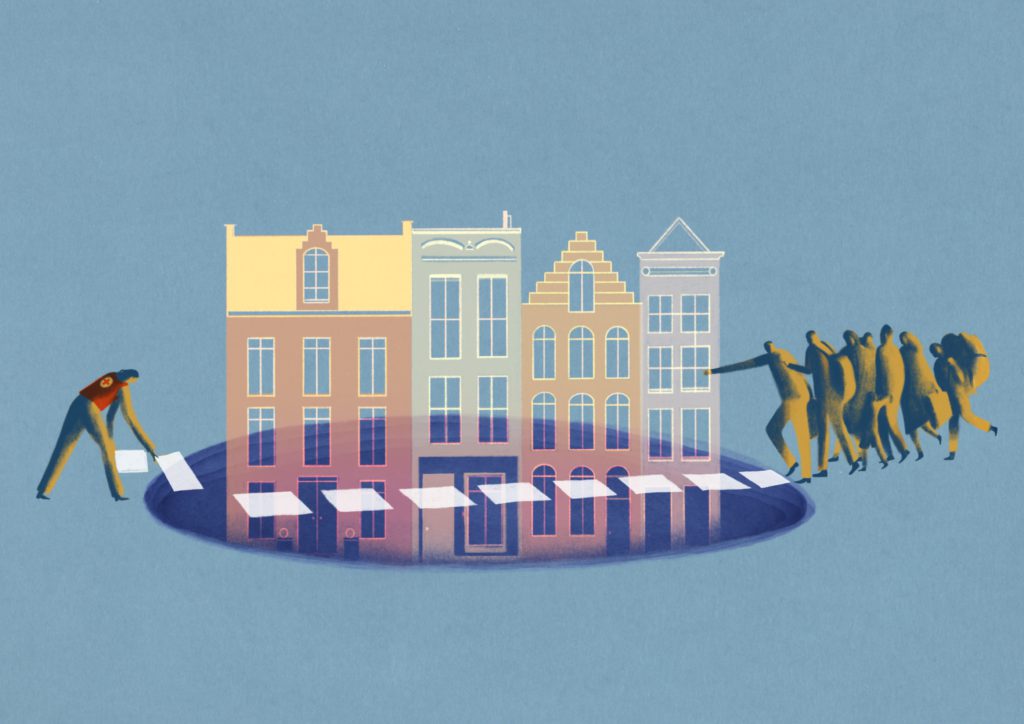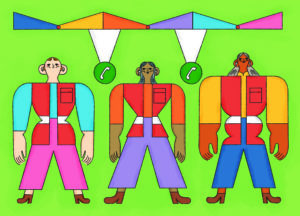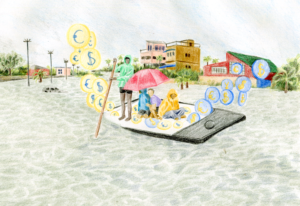
Description
The web-application built by the Netherlands Red Cross helps undocumented migrants to find their way to the support available to them, by sharing referral information on various topics.
This initiative is part of Direct Digital Aid, a package of three mutually enforcing digital services supporting undocumented migrants in the Netherlands. The other services are a WhatsApp Helpdesk and digital voucher aid. Direct Digital Aid has been developed by 510, the data and digital initiative of the Netherlands Red Cross.
Context
It is estimated that there are about 40.000 undocumented migrants (sometimes also called irregular migrants) in The Netherlands. This is a very diverse group, including, amongst others, people whose asylum request has been denied and the so-called unregistered economic migrants. The COVID crisis hit particularly hard on undocumented migrants. They don’t just face increased health risks, but also loss of means for subsistence (as especially the informal sector was impacted by the lockdowns) and lack of access to governmental support programmes. This is why the Netherlands Red Cross included undocumented migrants as a specific target group in their COVID response programme.
Support to undocumented migrants is challenged by the specific conditions of this group. People come from different countries, having diverse cultures and languages. Many of them move from one place to another, depending on where they manage to make a living, find shelter or support. In addition, the fact that they don’t have an official status in the country makes them trying to remain out of sight of the authorities. This however makes undocumented migrants also less visible for aid organizations.
In order to find out the best way to support these people, the Netherlands Red Cross conducted a range of interviews (co-design sessions) with both (formerly) undocumented migrants and aid workers (Red Cross and other aid organisations). From this, they learned that the most pressing issues for undocumented migrants include:
- Most undocumented migrants are not aware of their rights (for instance their right to health care).
- They often don’t know where to find support that is available to them (in the Netherlands, help for this group is scattered over many smaller and localized organizations)
- They lack money to cover their basic needs (incl. food, hygiene).
The Netherlands Red Cross also observed how vital mobile (smart) phones are for undocumented migrants. They depend on it to stay in touch with the wider community and to access relevant information and services during their journey and at their (temporary) destination. This made us realize that a mobile phone would be a very suitable entry point in connecting with them.
From co-designs with Red Cross staff and volunteers, they concluded that they need products and services that are:
- Flexible and easy to use (so that we can adjust or update them as per developing needs and context)
- Safe (adhering to the principle of ‘do-no-harm’)
- Scalable (easy to scale up and down depending on the scale of the crisis)
Based on these insights, 510 developed an aid package combining Digital CEA (Community Engagement and Accountability) and Digital CVA (Cash and Voucher Aid), including the helpful information web-app. The services are partly built around earlier developed and/or existing tools, and have been tailored to the particular context, needs and priorities of undocumented migrants in the Netherlands. Even though the three components can be seen as stand-alone services, the combination of it best supports undocumented migrants towards autonomy and self-reliance.
Technical details & Operations
The web-application (or web-app) that they built, helps undocumented migrants to find their way to aid organizations and local initiatives that could provide support to them.
Throughout all stages of the development they have used a Human Centred Design approach, involving both the end-users (undocumented migrants) and aid workers (a.o. Red Cross staff and volunteers). Co-design sessions and user tests with undocumented migrants ensure that the content of the web-app is relevant and the interface is easy to use.
The insights from the co-design sessions also informed the design of the system. Many undocumented migrants told the Netherlands Red Cross that they are lacking storage space on their phone (as they usually have cheaper, older models) and are therefore very selective in downloading applications. They also shared that they often depend on free WIFI (e.g. in the day and night shelter locations) that is shared with many others and therefore not very strong. The web-app has therefore been designed to be as lightweight as possible.
Similar sessions with Red Cross staff and volunteers resulted in system choices that ensure that the tool is easy to maintain and update.
As per the priorities shared by the end-users, the web-app contains contact details of organizations providing support on shelter, medical assistance, legal advice, safety, connecting with family and COVID-19. The web-app also contains a direct link to the Red Cross WhatsApp Helpdesk, in case a visitor of the website needs additional information.
The web-app currently covers six Dutch cities (Amsterdam, Utrecht, The Hague, Rotterdam, Almere and Lelystad) and more cities are planned to be added. The information on the web-app is in English. An exception is the information about COVID vaccinations (English, Dutch, Arabic, Polish, Turkish, Mandarin and Portuguese).
The back-end of the referral web-app is built in Google Sheets. As most Red Cross staff and volunteers are used to working with this, it makes it easy to update the information to include changes in needs and services. For instance, once COVID-19 vaccination became available for undocumented migrants, the Netherlands Red Cross used the web-app to inform undocumented migrants about where and how they could get a vaccination. The ability to quickly update the content of the referral website, at the headquarters as well as by the regional district offices and local branches, is key in making sure that the web-app remains relevant and reliable.
A dashboard presents meta-data about the use of the web-app, such as the number of clicks on the different categories of information, and the time and duration of a visit.
Deployment & Impact
The domestic department of the Netherlands Red Cross has been deploying the web-application with referral information since November 2020. As the geographical coverage of the web-app grew, so grew the number of visitors, from tens to thousands a month. The web-app became the main tool to inform undocumented migrants about COVID-19 and vaccination possibilities.
A year after its launch, the web-app has reached over 16.700 undocumented migrants and has had over 90.000 total/recurring visits. There was a clear peak in the months July and August 2021 with over 5.000 visitors a month (at the height of the COVID vaccination campaign).
From surveys and interviews with end-users we know that the web-app is very helpful to guide them where to find support. It makes them more autonomous and less dependent on aid organizations reaching out to them, and as such it can make them feel more empowered.
“It exceeded my expectations. When you talk about safety, I think police. I didn’t expect to find Fairwork or LGBTQ as protection that is there for us. This safety thing is one of the best things you have on the website. It helps us knowing what our basic rights are.”, said one of the undocumented migrants interviewed during the project evaluation.
Though this was not the original goal, the web-app has also become a referral reference tool used by aid workers supporting undocumented migrants, for example when answering questions that come in through the WhatsApp Helpdesk.





